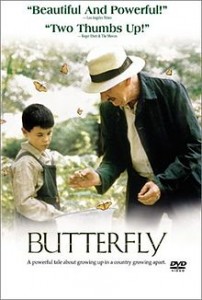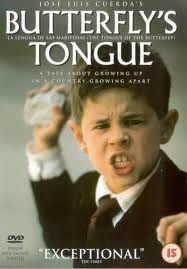 When you watch this movie along with Belle Époque (1992) and The Spirit of the Beehive (1973), you can understand the painful and silent times after the Spanish Civil War broke out in 1936 and the fascist administration superseded the Second Spanish Republic that was established in 1931. Belle Époque depicts the establishment of the republic, while The Spirit of the Beehive depicts the silent times of the 1940s. Butterfly’s Tongue depicts the arrival of the Spanish Civil War in 1936. Because this movie was made in 1999, the Franco administration had collapsed and democracy was restored, so Spanish artists could break the silence, cast away the symbolism used to protect themselves, and express their message frankly.
When you watch this movie along with Belle Époque (1992) and The Spirit of the Beehive (1973), you can understand the painful and silent times after the Spanish Civil War broke out in 1936 and the fascist administration superseded the Second Spanish Republic that was established in 1931. Belle Époque depicts the establishment of the republic, while The Spirit of the Beehive depicts the silent times of the 1940s. Butterfly’s Tongue depicts the arrival of the Spanish Civil War in 1936. Because this movie was made in 1999, the Franco administration had collapsed and democracy was restored, so Spanish artists could break the silence, cast away the symbolism used to protect themselves, and express their message frankly.
The movie is set in a remote town in Galicia, Spain in 1936. Moncho is a young boy with asthma entering elementary school one year late. The teacher Gregorio is kind to Moncho, who is shy and has a hard time fitting in. Gregorio teaches the children about various things beyond the curriculum, including life, literature, and love. The teacher takes the children on a fieldtrip in order to study living things. Gregorio promises Moncho, who is interested in the story of the butterfly’s tongue, that he will show him with a microscope. Moncho’s older brother Andrés joins a town band and expands his experience by travelling around for concerts. Moncho’s father supports the Republican Party, while Moncho’s mother does not believe in the Republicans, but it does not hinder their married relationship. There is friendship and respect between the father and the teacher Gregorio.
 However, the day that the town is seized by fascism at last arrives. In order to protect his family, the father, who had until then made it clear he was a supporter of Republicans, goes to the town square with other townspeople in order to participate in humiliating the arrested Republicans. In order to protect the family, the mother boos and jeers the people arrested, while the brothers watch silently; Andrés is surprised to see his bandleader who had been kind to him among the arrested, while Moncho is surprised to see his close friend’s father. At the end of the line of people who were arrested is the teacher Gregorio. The father, with pain, also starts to insult. At the urging of his mother, Moncho insults the teacher that he loves with, “Communist!” and “Atheist!” while throwing rocks.
However, the day that the town is seized by fascism at last arrives. In order to protect his family, the father, who had until then made it clear he was a supporter of Republicans, goes to the town square with other townspeople in order to participate in humiliating the arrested Republicans. In order to protect the family, the mother boos and jeers the people arrested, while the brothers watch silently; Andrés is surprised to see his bandleader who had been kind to him among the arrested, while Moncho is surprised to see his close friend’s father. At the end of the line of people who were arrested is the teacher Gregorio. The father, with pain, also starts to insult. At the urging of his mother, Moncho insults the teacher that he loves with, “Communist!” and “Atheist!” while throwing rocks.
What is most frightening in this movie is that the people who had peacefully lived together in this town completely divide into friends and enemies because of the Civil War. Before the Civil War started, there were small problems or disputes between married couples, within families, at school, or in church. However, the town was able to overcome these small differences by working together as a community. As the struggle for central power gradually becomes more extreme, however, the faces of the townspeople change, and in the end, the community is destroyed by hatred, fear, fighting, and stone throwing. The fight between Fascists and Republicans is not an abstract battle performed by the distant central government. Here, it is the terrifying reality that your neighbor yesterday becomes your persecutor today.
Another scary thing is that children sensitively notice their parents’ fear for their family’s safety, and the children’s actions become more radical than their parents. In this movie, the parents do not wish for war and don’t want to hurt others, but they know that if they support the arrested Republicans, tomorrow it could be them, so they insult the Republicans to protect themselves. However, the children sensitively perceive the fear, and go beyond their parents’ actions. It is scary that the children cannot control their actions because they don’t understand the consequences.
However, this movie doesn’t blame Moncho for throwing stones at the teacher Gregorio who cared for Moncho dearly. The times that forced the child to act in such a way are to be blamed; the child doesn’t understand what is happening, but senses that something is happening. As in China’s Cultural Revolution and with Cambodia’s Khmer Rouge, children were the ones who cruelly persecuted adults, but someone else was in the background to make the children act this way.
Franco died in 1975, and Spain established a truly stable democracy in 1981, but those who opposed Franco had to wait until 2008 for their honor to be restored. There must be many people in Spain like the teacher Gregorio who had their honor snatched away and died.
